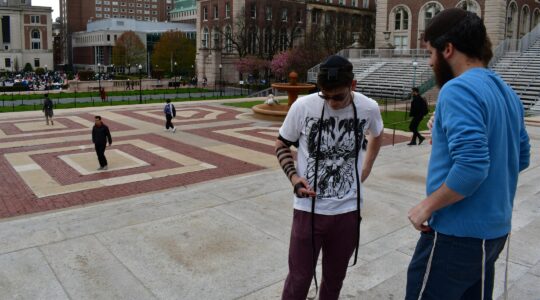NEW YORK (JTA) – A fierce feud has erupted between the Anti-Defamation League and Boston-area donors over the organization’s firing of its regional director and refusal to call the World War I massacres of Armenians a genocide.
The ADL last week fired Andrew Tarsy, the head of its New England office, after he publicly called the organization’s stance on the Armenian massacres “morally indefensible.” In subsequent days, Tarsy has drawn support from members of the ADL’s New England regional board and the Jewish Community Relations Council of Greater Boston. In addition, several prominent Jewish communal figures in Boston – including, a former AIPAC chairman, the chairman of Americans for Peace Now and Harvard Law Professor Alan Dershowitz – have either voiced support for Tarsy’s side or directly criticized the ADL.
The ADL has been under fire since the Armenian community in Watertown, Mass., one of the country’s largest, began agitating to have the town rescind its participation in a popular anti-bigotry program the ADL sponsors, “No Place for Hate.” On Aug. 14, the Town Council unanimously voted to end its relationship with the program, and other Massachusetts communities are reported to be considering similar moves. Watertown’s Armenian community was piqued by the ADL’s longtime refusal to support legislation pending in Congress that would recognize the massacres as genocide. The ADL’s regional board is reported to be supporting the resolution, but the organization’s national director, Abraham Foxman, has refused to support the measure, which is vigorously opposed by Turkey, Israel’s closest Muslim ally.
Foxman and Glen Lewy, the ADL’s national chair, responded to the controversy in a 3-page letter in which they rejected the regional board’s call to retain Tarsy as “impossible to honor.” While ADL employees are not required to abandon their personal beliefs, the letter said, they should resign if they are unable to carry forth the organization’s policies. Boston’s regional board is due to meet Wednesday to discuss further measures, according to its chairman, James Rudolph.
Foxman has said that the genocide question should be resolved by historians, and in a statement to be published as an advertisement in regional newspapers this week, the ADL called the legislation “counterproductive.” While he has previously acknowledged that concern for the safety of Turkey’s Jewish community is a factor in his thinking, the letter to the Boston board provides the clearest glimpse yet of the difficulties inherent in balancing the ADL’s universal commitment to human rights and the particular needs of the Jewish community.
We recognize that “we are a Jewish agency whose mission is to work for the community while paying attention to the more universal goals we share with others,” the letter states. “And when those two elements of our mission come into direct conflict, we do not abandon the Jewish community.”
Foxman told JTA he was surprised that critics were “not willing to give us any credit that this is a serious decision, a serious judgment, and a painful judgment.”
“I am surprised at the intensity,” Foxman said.
For some, the ADL’s position reflects a narrow, short-term perspective.
“National ADL has adopted a policy which is consistent with what it has done on other issues, which simply disregards morality believing that the highest interest is what it conceives as the short term interest of Israel,” said Franklin Fisher, a Bostonian and the national chair of Americans for Peace Now, who stressed that he was speaking on behalf of himself, and not his organization.
“I think that’s a disgraceful way to behave, and I think it’s extremely short-sighted in terms of the long term interests of the Jewish People and the long-term interests of Israel,” Fisher said. “We must not take the position that we will take the side of anybody who does anything if they are willing to have a decent position as regards Israel. In the long run that makes us terribly unpopular.”
The ADL’ s policy and the firing have sparked widespread outrage in Boston, where the Jewish and Armenian communities have good relations.
The Boston Globe reported Monday that two members of the ADL’s regional board have resigned. Harvard Law Professor Alan Dershowitz co-wrote an op-ed in Saturday’s Globe describing the ADL’s regional board as “courageous and correct” to affirm the genocide. Steven Grossman, a former chairman of the American Israel Public Affairs Committee and a former member of ADL’s regional board, reportedly called the firing “a vindictive, intolerant, and destructive act” that would harm the organization’s fundraising. The Boston Jewish Community Relations Council, of which ADL is a member, issued a statement affirming its position on the genocide and expressing support for Tarsy and the ADL’s regional board.





